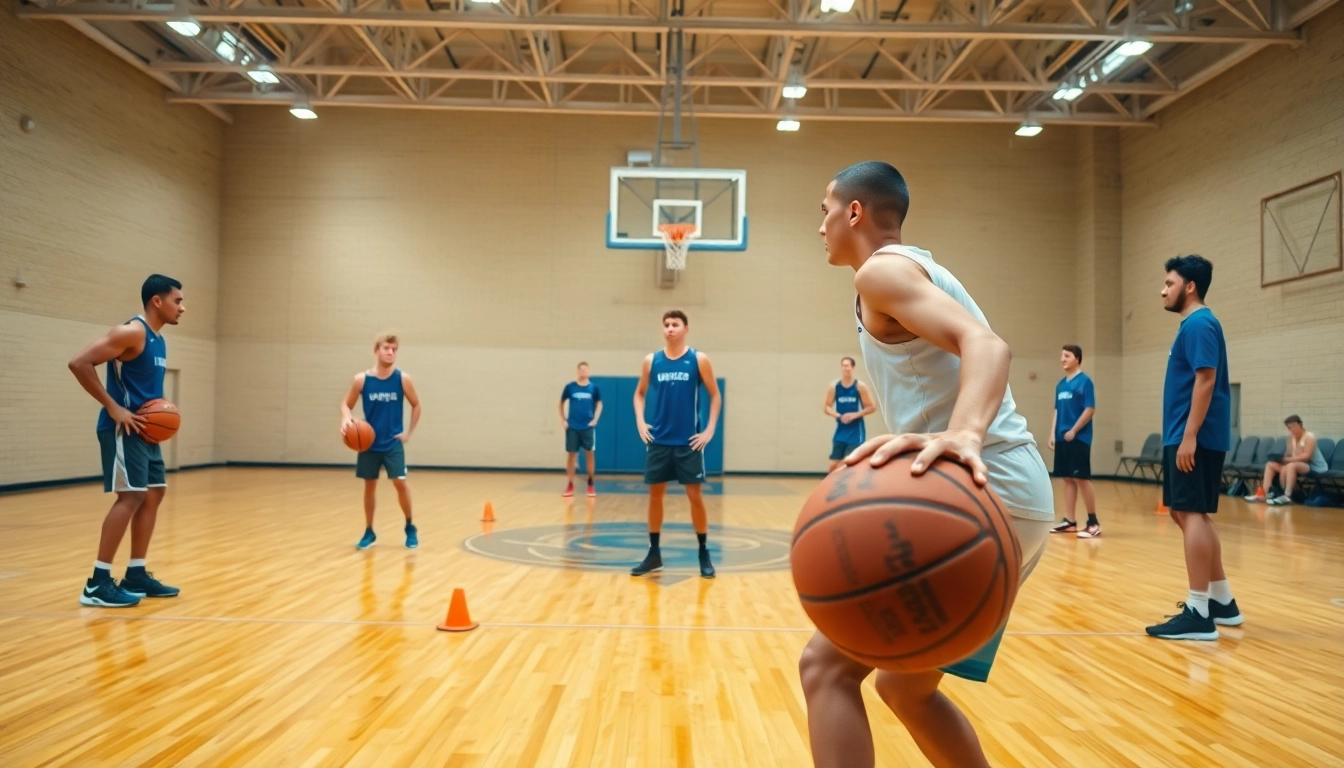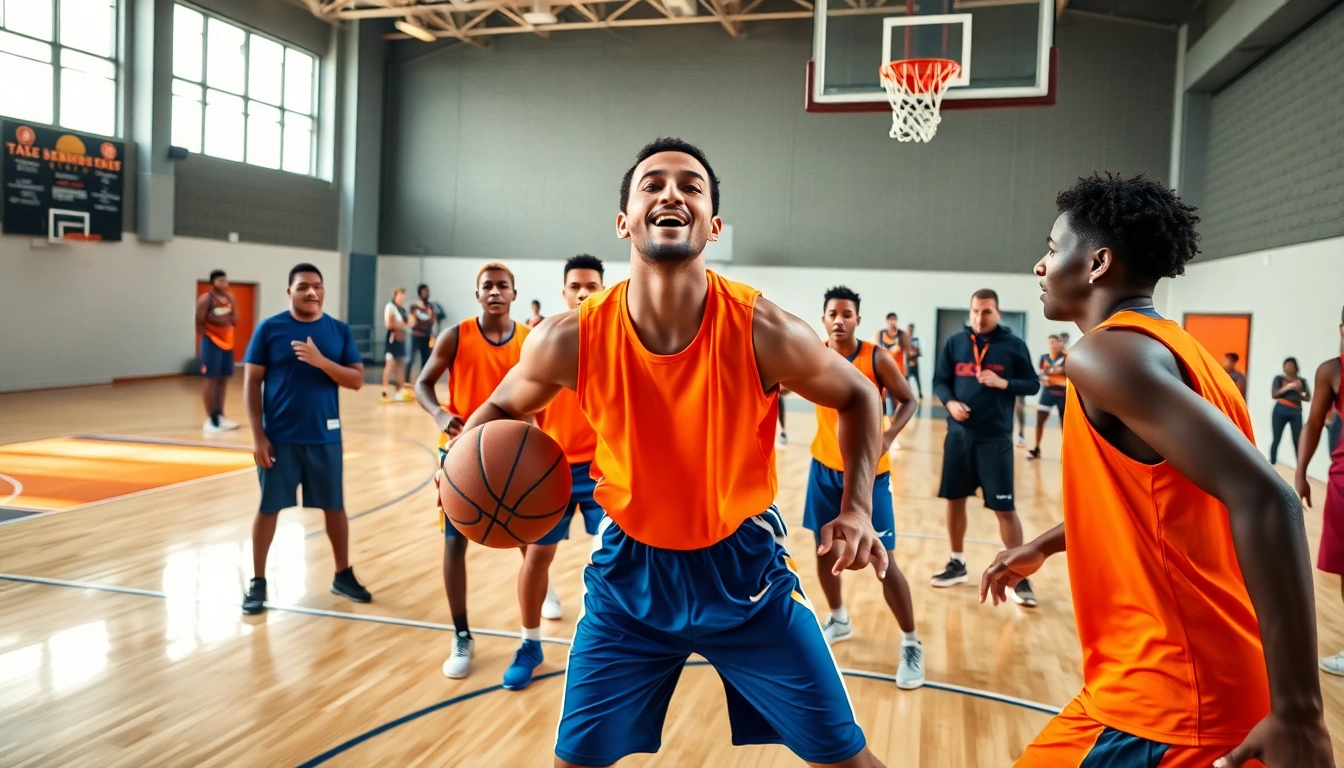Understanding Basketball Training Programs
What Are Basketball Training Programs?
Basketball training programs are structured programs designed to improve players’ skills, fitness, and understanding of the game. These programs can range from individual coaching sessions, where athletes receive personalized attention to enhance their shooting, dribbling, and defensive skills, to larger group settings that promote teamwork and competitive play. Typically, these programs are led by experienced coaches who have a background in coaching or playing basketball at various levels, from high school to professional. They often include a blend of drills, tactical education, and competitive scrimmages to ensure a well-rounded development experience.
Why Look for Basketball Training Programs Near Me?
When searching for basketball training programs near me, there are several reasons to prioritize local options. Proximity allows for ease of attendance, saving time and resources while fostering a consistent training schedule. Additionally, local programs often maintain a strong connection with community leagues, high schools, and youth clubs, which can facilitate opportunities for participants to showcase their skills in local competitions. Lastly, local programs may also offer networking opportunities with fellow athletes, coaches, and recruitment scouts who can provide guidance and advice on potential pathways to higher levels of competition.
Benefits of Local Training Programs
Enrolling in local basketball training programs comes with numerous benefits. Firstly, they are typically more accessible and affordable than national or elite training camps, making them a practical choice for athletes at various levels. Moreover, local programs often address the specific needs and challenges of the community, tailoring their offerings to meet the requirements of both youth and adult players. They also promote camaraderie among local players, fostering competitive spirit while building friendships. Finally, many local programs are anchored in community engagement, promoting not only athletic skills but also character development, teamwork, and sportsmanship.
Types of Basketball Training Available
Group Training vs. Individual Sessions
Basketball training can be categorized into group training and individual coaching sessions. Group training typically involves several players who work together under the guidance of a coach. This format allows athletes to enjoy a collaborative environment, learning skills while competing against one another. It can be particularly effective for developing teamwork and understanding game dynamics.
On the other hand, individual training focuses on personalized development, where coaches tailor programs to meet the specific needs of the athlete. This is particularly valuable for players looking to hone specific skills or address weaknesses in their performance. In many cases, a combination of both formats can yield the best results, allowing athletes to benefit from social learning and personalized feedback.
Skill Development Camps and Clinics
Skill development camps and clinics provide high-intensity training experiences focused on developing specific basketball skills. These programs often occur during school breaks or over weekends, offering an immersive experience for athletes. Camps usually cater to a broader age range than regular sessions, which invites competition from various skill levels. Here, athletes can participate in shooting contests, agility drills, and scrimmages designed to mimic the challenges of real games. Moreover, many camps invite guest speakers or professional players to share experiences and tips, adding further value to the participants.
Specialized Training Programs for Youth
Specialized training programs for youth are crafted to cater specifically to younger players, focusing on foundational skills as well as fun and engagement in the sport. These programs often include age-appropriate drills designed to develop essential skills like ball handling, passing, and shooting mechanics. Emphasis is placed not only on skill development but also on fostering a love for the game. Such programs typically feature lower coach-to-player ratios, allowing for more individualized instruction and a focus on creating a positive, encouraging environment.
How to Choose the Right Program
Identifying Your Goals and Skill Level
Before signing up for a training program, potential participants should evaluate their basketball goals and current skill level. Are you in the beginning stages of learning the game, or are you looking to refine skill sets at a competitive level? Understanding your objectives will enable you to target programs that best fit your needs. Your goals may include improving your shooting percentage, increasing athleticism, or preparing for a competitive season. Consequently, aligning your expectations with a program that offers specific training for your goals is critical for success.
Evaluating Coaching Qualifications
An essential factor in the effectiveness of basketball training programs is the qualifications and experience of the coaches involved. When researching potential programs, examine the coach’s background, years of experience, level of play, and educational credentials. An effective coach should not only be knowledgeable about basketball techniques but also possess the ability to communicate effectively with athletes, encouraging motivation and growth. Inquire about their coaching philosophy, success stories, and testimonials from former athletes who have trained under them.
Reading Reviews and Testimonials
Feedback from previous participants can provide valuable insights into the quality of a training program. Reviews and testimonials reveal the effectiveness and strengths of programs, as well as potential drawbacks. Look for detailed feedback discussing the training atmosphere, coaching style, and improvements made by athletes. This real-world perspective can streamline the decision-making process, ensuring a well-informed choice that aligns with your developmental aspirations.
Pricing and Commitment Considerations
Typical Costs of Basketball Training Programs Near Me
The cost of basketball training programs can greatly vary based on several factors, including the program’s location, duration, intensity, and the expertise of the coaching staff. On average, group training sessions may range from $20 to $100 per session, while private lessons can typically range from $50 to $250 per hour, depending on the coach’s experience. Seasonal camps offer slightly different pricing structures, where participants often pay a flat fee for a week’s worth of training. It’s essential to assess the value offered in relation to the costs when evaluating options.
Commitment Levels and Scheduling
Understanding the commitment required for a basketball training program is crucial before enrollment. Some programs may demand full-season or year-round commitments, while others might offer shorter camps or clinics. Be sure to check the scheduling arrangements and determine if they fit into your lifestyle. Flexibility can be a significant determinant in sustaining engagement, especially for student-athletes balancing academic obligations alongside their training.
Financial Aid and Scholarships for Training
Many training programs recognize financial constraints and offer scholarships or financial aid options for deserving participants. Research available programs that may provide relief for families who might struggle with tuition costs. Also, inquire about payment plans that make training more accessible without incurring financial burden. Often, sports organizations and non-profits may provide financial assistance, especially for youth programs aimed at developing athletic potential in underserved communities.
Maximizing Your Training Experience
Setting Achievable Goals
Setting realistic and achievable goals is essential for maximizing the effectiveness of any basketball training program. Break down larger ambitions—like making a high school team—into smaller, concrete objectives. For instance, aim to improve free-throw shooting accuracy, increase vertical leap, or enhance defensive skills over a set timeline. These measurable benchmarks can help maintain motivation and provide a sense of accomplishment, influencing overall performance improvements.
The Importance of Consistent Practice
Consistency is pivotal in sports training. Committing to regular practice, whether through scheduled training sessions or independent workouts, can significantly enhance skill acquisition. Athletes should develop a structured weekly or monthly training regimen that integrates skills practice, physical conditioning, and rest. Moreover, tracking progress through journals, apps, or videos can aid in identifying areas of improvement and ensure continued development in line with established goals.
Tracking Progress and Adjusting Training Plans
Every athlete’s journey involves unique challenges and breakthroughs. As such, it is vital to implement a system of tracking personal progress and adjusting training plans accordingly. Regular evaluations can help identify successful strategies and aspects requiring adjustment. Discuss progress with coaches and solicit feedback; this dialogue can lead to tailored modifications in training protocols to enhance overall results. Mimicking a responsive approach ensures continuous improvement and keeps players engaged in their development.



